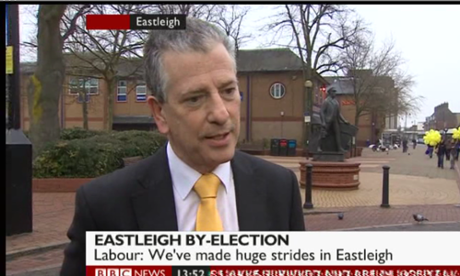Graham, Tom and Ian
Your Lib Dem team for Cheadle West & Gatley Learn more
When Labour got 49% in Eastleigh: the slow death of two party politics in Britain
by Lib Dem team on 1 March, 2013

Labour: “We’ve made huge strides in Eastleigh”
In yesterday’s by-election, Labour secured just 9.82%. If you exclude 2010, you have to go back to 1987 to see the last time Labour even failed to top 20% in an Eastleigh poll. Yesterday’s vote was Labour’s second lowest share in over half a century.
The combined total of the two big parties, which between them have run the UK for nearly a century, is even more stark. As recently as 1992, the Labour and Conservative vote combined was 72%. Last night it halved to 36%.
This was a by-election in a single southern seat, and that comes with all sorts of health warnings: as ever, reading too much into any one result is foolish. If you want to draw a dodgy conclusion from Eastleigh, UKIP may want to consider than historically the second-placed party in every past Eastleigh by-election has gone on to win the following General Election by a landslide!
But using it to illustrate a well-established trend is reasonable. How often in a parliamentary by-election do neither Labour nor the Conservatives finish in the top two?
For nearly a century, class-bound Britain has flipped between red and blue, blue and red with the smaller parties trying to grab a few crumbs from the table.
The evidence seems to suggest that, even without the firm push of a fair voting system, British voters see those old tribal loyalties as a thing of the past.
The Lib Dems can take a lot of comfort from the by-election. As an unpopular party of Government, in a by-election in a marginal seat triggered by the resignation of a disgraced MP and in the week of a concerted media campaign against the party, we still won – and with a majority higher than in either 2005 or 1997. That may not say too much about how the party will fare in Labour’s heartlands, but it gives the party confidence that it can win, even now, even with everything that’s been thrown at us. It also supports the party’s 2015 General Election strategy of fighting it as around 80-100 individual by-election campaigns.
Those who thought the Lib Dems were dead in the water and look forward to a cosy return to two party politics are likely to be disappointed. The Lib Dems are here to stay, and it seems likely that UKIP and other smaller parties are too.
3 Comments
Well done UKIP !
Is it time for a British Unite the Right movement, and also a merger between the Conservatives and UKIP? Because if this result is replicated across the UK in 2015 there could be a large majority of votes cast for right wing parties but a massive left wing, Europhile majority in Westminster after the next election.
You may be right about the outcome, Shanna.
Of course, if we’d voted to change to a fairer election system in the referendum, then parties would see the number of seats in Parliament much more in line with the numbers of people who voted for them. Unfortunately, that opportunity is lost for a generation and we’re stuck with the unfair system we’ve got.